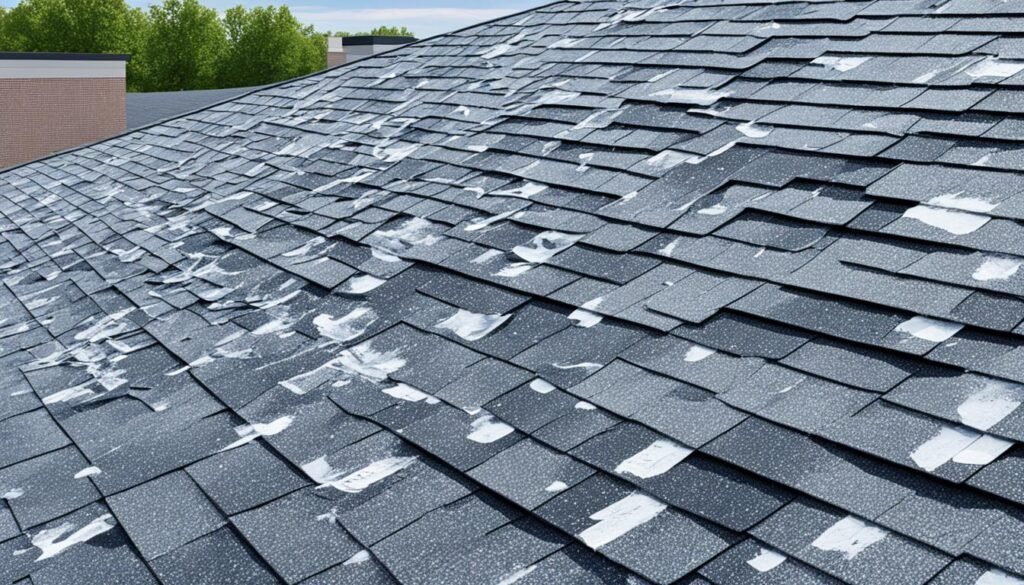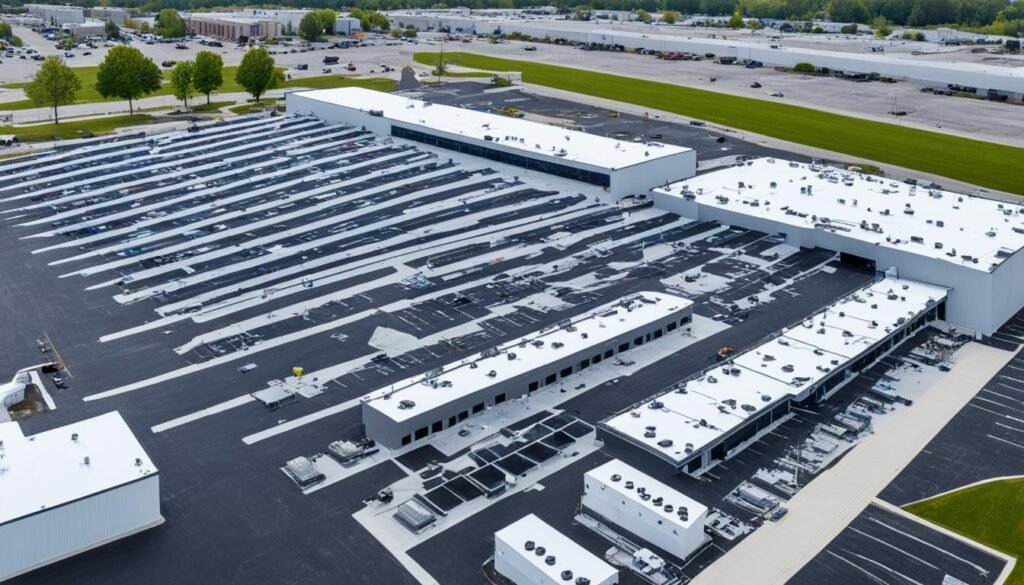Did you know that the lifespan of a commercial roof can range from 10 to 45 years depending on various factors? That’s right, the durability and longevity of your commercial roof are influenced by the type of materials used, the installation process, and proper maintenance.
When it comes to the costs associated with commercial roofs, it’s essential to consider these factors in order to make informed decisions. So how much should you spend on a roof? What are the affordable roofing options available? And what factors should you consider when estimating roofing expenses?
Key Takeaways:
- The lifespan of a commercial roof can vary from 10 to 45 years.
- Factors such as materials, installation, and maintenance impact roof longevity.
- Considering affordable roofing options and estimating expenses is crucial.
- Proper installation and regular inspections can help maximize lifespan.
- Choosing a budget-friendly roofing solution requires careful consideration.
Factors Affecting Commercial Roof Lifespan
The lifespan of commercial roofs is influenced by various factors that can impact their durability and longevity. Understanding these factors is essential for maintaining and extending the lifespan of your commercial roof.
Impact of Climate on Roof Lifespan
The climate in which your commercial property is located plays a significant role in determining the lifespan of your roof. Exposure to extreme weather conditions such as cold temperatures, heavy snowfall, or frequent rain can cause degradation of roof components over time. These weather conditions can lead to the deterioration of roofing materials, weakening the structural integrity of the roof and shortening its lifespan. Properly designed commercial roofs that account for the specific climate conditions in your area can help mitigate these effects and ensure a longer-lasting roof.
Importance of Proper Installation
The installation process of a commercial roof is a crucial factor that can significantly impact its lifespan. Poor installation can result in hidden leaks, inadequate drainage, and premature roof repairs. These issues can accelerate the deterioration of the roof and reduce its overall lifespan. It is essential to hire experienced and reputable roofing contractors who follow proper installation techniques and adhere to industry standards. Investing in professional installation can help ensure that your commercial roof performs optimally and lasts for its intended lifespan.
Flat Roof vs. Sloped Roof
The type of roof on your commercial property, whether flat or sloped, can also affect its lifespan. Flat roofs are more prone to water accumulation if not properly drained, which can lead to leaks and structural damage. On the other hand, sloped roofs naturally shed water more effectively, reducing the risk of water-related issues. Proper drainage systems and regular maintenance are crucial for flat roofs to prevent water accumulation and maximize their lifespan.
Sun Exposure and Roof Decay
Sun exposure can also have a significant impact on the lifespan of a commercial roof. Prolonged exposure to the sun’s UV rays can cause roof colors to fade and accelerate the degradation of roofing materials. This can result in cracks, warping, and deterioration of the roof over time. Choosing roofing materials that are resistant to UV damage can help mitigate these effects and increase the lifespan of your commercial roof.
Ventilation and Insulation for Roof Longevity
Proper ventilation and insulation are critical factors in maintaining a stable temperature within your commercial property and extending the lifespan of your roof. Adequate ventilation prevents the buildup of moisture, which can lead to mold growth and structural damage. Insulation helps regulate temperature and reduce energy consumption, which can further contribute to the longevity of your roof. Investing in proper ventilation and insulation systems can help create a healthier and more energy-efficient commercial environment while preserving the lifespan of your roof.
Regular Roof Inspections
Regular roof inspections are essential for identifying any issues that may shorten the lifespan of your commercial roof. Inspections can detect early signs of damage, such as leaks, cracks, or loose roofing materials, allowing for timely repairs and maintenance. By addressing these issues promptly, you can prevent further damage and extend the lifespan of your commercial roof. It is recommended to schedule professional roof inspections at least twice a year, and after severe weather events, to ensure the overall health and longevity of your roof.

Understanding the factors that affect the lifespan of commercial roofs is crucial for making informed decisions about your roofing system. By considering and addressing climate impacts, ensuring proper installation and maintenance, choosing the right roof type, protecting against sun exposure, implementing ventilation and insulation systems, and conducting regular inspections, you can maximize the lifespan of your commercial roof, saving both time and money in the long run.
Lifespan of Different Commercial Roofing Materials
When it comes to commercial roofing, the lifespan of the materials used can significantly impact the longevity and durability of your roof. Understanding the lifespans of different roofing materials is essential for making informed decisions and choosing the right option for your commercial property. Let’s explore the lifespans of some popular commercial roofing materials:
TPO Roof
TPO roofs, also known as Thermoplastic Olefin roofs, are popular for their durability and energy efficiency. With proper installation and maintenance, TPO roofs can last between 22 and 30 years. These roofs are resistant to UV radiation, chemical exposure, and extreme weather conditions, making them a reliable choice for commercial buildings.
EPDM Roof
EPDM roofs, made from synthetic rubber, offer exceptional durability and flexibility. When installed and maintained properly, an EPDM roof can last up to 50 years. EPDM roofs are resistant to UV radiation, ozone, and hail damage, making them suitable for various climates and weather conditions.
Metal Roof
Metal roofs are known for their longevity and durability. The lifespan of a metal roof depends on factors such as metal type, installation quality, and maintenance. When well-maintained, metal roofs can have an indefinite lifespan, with some lasting over 50 years. Metal roofs are resistant to fire, hail, and strong winds, making them an excellent choice for commercial buildings.
Asphalt Roof
Asphalt roofs are widely used in commercial buildings and offer a balance between affordability and performance. The lifespan of an asphalt roof varies depending on the slope of the roof. Low-slope asphalt roofs typically last between 15 and 20 years, while steep-slope roofs can last up to 40 years with proper maintenance.
It’s important to note that warranties offered by manufacturers can provide insight into the expected lifespan of a commercial roof. Be sure to consider the warranties offered for each roofing material when making your decision.
Remember, proper installation, regular inspections, and maintenance are key to maximizing the lifespan of any commercial roofing material. Consult with a professional roofing contractor to determine the best roofing solution for your specific needs.

| Roofing Material | Average Lifespan | Key Features |
|---|---|---|
| TPO | 22-30 years | UV and chemical resistance |
| EPDM | Up to 50 years | Flexibility and ozone resistance |
| Metal | Indefinite (50+ years) | Fire and hail resistance |
| Asphalt | 15-40 years | Affordability and versatility |
Conclusion
The lifespan of a commercial roof is significantly influenced by various factors, including the type of materials chosen, the local climate, the installation process, and ongoing maintenance. To ensure a long-lasting and cost-effective roofing solution, it is crucial to prioritize proper installation, regular inspections, and consistent maintenance practices.
By investing in high-quality materials and professional installation services, you can greatly enhance the durability and longevity of your commercial roof. This not only helps you avoid costly repairs and premature replacements but also provides peace of mind knowing that your property is well-protected.
When estimating roof costs, it’s essential to consider several factors. These include the type of materials best suited for your specific needs, the climatic conditions your roof will endure, and the expected lifespan of the chosen roofing system. Taking into account these crucial aspects allows you to make informed decisions while choosing a budget-friendly roofing solution that ensures long-term durability and cost-effectiveness.
Remember, proper roof maintenance plays a pivotal role in preserving the structural integrity of your commercial property. Regular inspections, prompt repairs, and routine cleaning help prevent small issues from escalating into major problems, ultimately prolonging the lifespan of your roof and safeguarding your investment.
FAQ
How much should you spend on a roof?
The amount you should spend on a roof depends on various factors, including the size and complexity of your commercial building, the type of roofing material you choose, and any additional features or requirements. It’s recommended to obtain multiple quotes from reputable roofing contractors to compare prices and ensure you’re getting a fair deal.
What factors influence commercial roof costs?
Several factors can influence the cost of a commercial roof, including the type of roofing material, the size and complexity of the roof, the need for roof repair or replacement, additional features such as insulation or ventilation, and the contractor’s labor and overhead costs. It’s important to consider these factors when estimating the expenses for your commercial roof project.
What are some affordable roofing options for commercial properties?
There are several budget-friendly roofing materials available for commercial properties. Some options include TPO (Thermoplastic Olefin) roofs, which are known for their durability and energy efficiency, as well as EPDM (Ethylene Propylene Diene Monomer) roofs, which are resistant to UV rays and weathering. Metal roofs can also be cost-effective and offer longevity, while asphalt roofs provide an affordable option for steep-sloped roofs.
How can I estimate the expenses for commercial roof repair or replacement?
To estimate the expenses for commercial roof repair or replacement, it’s best to consult with a local roofing contractor who can assess the condition and specific needs of your roof. They will consider factors such as the size and complexity of the roof, the type of materials required, any necessary repairs or modifications, and the labor costs. Obtaining multiple quotes will help provide a more accurate estimate.
What are some cost-effective options for commercial roof repair?
The cost of roof repair can vary depending on the extent of the damage and the materials involved. Some cost-effective options for commercial roof repair include patching small areas of damage, reinforcing weak spots with additional materials, and addressing minor leaks or issues early on to prevent further damage. Regular maintenance and inspections can help identify and address potential problems before they escalate.
How do I compare roofing quotes from different contractors?
When comparing roofing quotes, it’s important to consider factors beyond just the price. Look for reputable and experienced contractors who provide detailed quotes outlining the scope of work, materials used, warranties offered, and any additional services or benefits. Consider the contractor’s reputation, customer reviews, and qualifications to ensure you’re choosing a reliable and trustworthy professional.
Where can I find local roofing contractors in Murrieta?
For local roofing contractors in Murrieta, you can visit roofingcontractorsmurrieta.com. This website provides a directory of professional roofers in the area, making it easy to find qualified contractors for your commercial roofing needs.